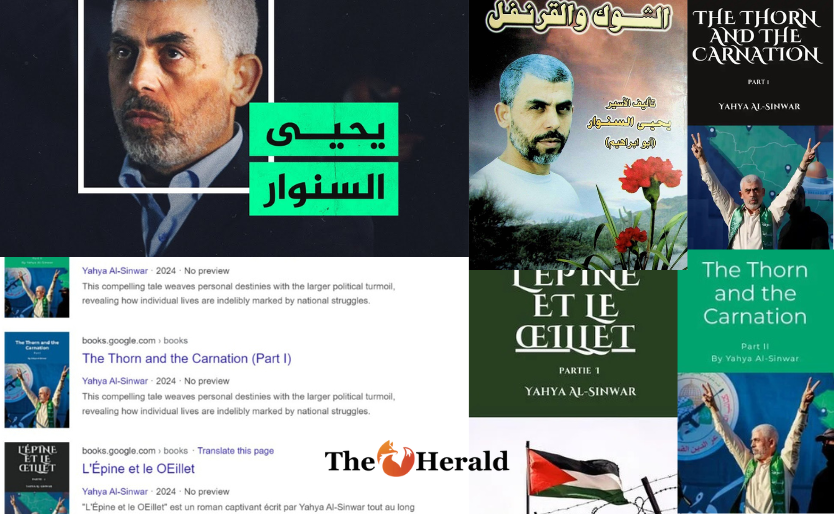Sinwar lives through his books and the pen is no less important than gun
Yahya Sinwar, the leader of the Islamic Hamas movement in the Gaza Strip, who was killed a few days ago when confronting the IDF inside the Gaza Strip, is the icon of the conflict and not only a prominent military figure, but also literature through his books classified in prison literature and his translations of the books of Israeli leaders, which also reflect the Hebrew mentality within the occupied entity. Sinwar spent more than two decades in Israeli prisons because of his political and military activity. During this period, he wrote and translated a number of important books due to his understanding of the Hebrew language and Israeli society, which show some of his political and military personality and his view of the conflict with the occupied entity.
Sinwar is dedicating himself to both politics and literature while in prison
After a period of Sinwar’s arrest, he didn’t waste his time in prison, but he used that period to compose, write and translate in secret. These books that we will present are not only ordinary literary works, but they are a window into the core of the ideas of the man in the military and political leadership, and they are also a window into understanding Sinwar’s vision of resistance and politics and his people’s conflict with the occupying entity of his land, as he was one of the first to present a complex vision that combines military thought and political practice in the literature of the Palestinian resistance.
The Five Books of Understanding Sinwar
During his years in prison, Sinwar produced five pivotal books that are a building block for understanding his intellectual approach:
Book 1: “The Shin Bet Among the Fragments” by Karmi Gilon
It is a translation that reflects his deep interest and firm understanding of the Israeli mentality from within, and it also provides a critical narrative of Israeli operations from the vision and perspective of one of the prominent figures in the Israeli security apparatus, who provided him with a cognitive dimension and understanding of any resistance leader who seeks to better understand his enemy.Sinwar’s
translation of this book reflects his deep interest in understanding the Israeli mentality from within, which helped him develop the resistance strategies later adopted by Hamas. The book provides a critical view of Israeli operations from the perspective of one of the leading figures in the Israeli security apparatus, adding an important cognitive dimension to any resistance leader seeking to better understand his enemy.
The Book of Israeli Parties
Issued in 1992, it is one of the works translated by Yahya Sinwar, as it provides a comprehensive political overview of the most prominent political parties in Israel and their political orientations in the 1990s, which is an important source for understanding the political dynamics within Israeli parties during that critical period of the history of the Palestinian-Israeli conflict.
Book of Glory
Authored by the Hamas Sinwar commander during his detention in occupation prisons, it is a comprehensive study of the Israeli Shin Bet and its intelligence methods, including information gathering, the implantation of agents, and the brutal investigative methods it uses. The book is divided into four sections that give the reader an overview of the Israeli security services and the objectives on which the Shin Bet is working, as well as an analysis of its roles in confronting Islamic movements such as Hamas, and also seeks to provide an accurate understanding of Israeli security methods, which enhances the ability of the resistance in the face of occupation.
Hamas : experience and error
Sinwar contributed to this book by developing a variety of his strategic vision for Hamas, after assuming the presidency of the movement in 2017, as he strengthened the organization of the movement and reorganized it from within. He was also credited with coordinating the movement between its military and political wings and crystallizing political decisions to confront the occupation, and the ability to have greater effectiveness on the ground in the media, politics, military and intelligence.
Thorns and cloves
Literary work that tells the story of the Palestinian struggle since 1967 until today. In 30 chapters, the novel deals with the most important events in the Palestinian cause, explaining the conflict and the challenges faced by the resistance, as well as focusing on the difficult social conditions experienced by Palestinians, such as poverty, poor services and the nature of social relations between people.
Sinwar wrote between influencing Hamas and the resistance
These books, whether written by the late leader Yahya Sinwar, were not just ordinary intellectual productions, but an idea followed by Hamas and resistance fighters, as his intellectual works contributed to the development of resistance tactics and to understanding inside and outside, and international and regional relations, as these intellectual sources are the ones on which Hamas relied in its recent confrontation and the management of most of its military and political operations.
Sinwar’s intellectual legacy is not dead
Yahya Sinwar left an intellectual legacy on his lack, but it is no less important than his role and his rich fieldwork, and the books he wrote and translated in prison, were not individual intellectual productions, but part of an intellectual movement aimed at educating new generations of fighters and politicians, especially after the ”Flood of Al-Aqsa ” or the ‘7 October events’ ‘. Before and after his departure, he was able to prove that the pen is no less important than the gun, that the book can also become a weapon in the battle of liberation and liberation, and that he will remain “alive” in his books and ideas through the minds and hearts of those who will read his books that have formed and will form part of the intellectual literature of the Palestinian resistance


Leave a Reply